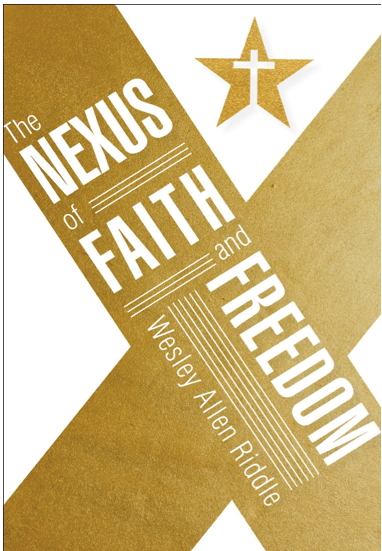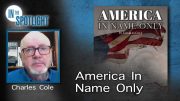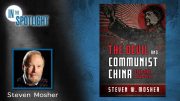
The Nexus of Faith and Freedom, by Wesley Allen Riddle, Mustang, Oklahoma: Tate Publishing, 2012, 382 pages, softcover.
In early America, ordered liberty was understood to require a lively cooperation, or nexus, between Christian faith and American freedom. In recent times, however, this understanding of American liberty has been fading from national awareness. To help restore ordered liberty, Wesley Allen Riddle wrote The Nexus of Faith and Freedom — a compilation of his weekly newspaper columns previously published between 2000 and 2010 — in which he illustrates how, with God’s help, Americans can escape from the spiritual and political confusion of modern times by reinvigorating our faith-inspired, and faith-preserving, institutions of freedom.
During the last two centuries, ordinary common sense has deteriorated to such an extent that Riddle refers to his straightforward columns as “good ole American horse sense,” in recognition of the simple but refreshingly dependable awareness that horses have always naturally exhibited. At the same time, for the deeper edification of his readers, Riddle weaves into his columns ideas from Western Civilization and British antecedents of American thought, thereby making select writings from our past, as well as analyses by numerous scholars, more readily accessible to the reader. Riddle — a West Point graduate, veteran of Desert Storm/Desert Shield, Oxford University graduate with a Master of Philosophy degree focused on American history, and now Professor of Government at Central Texas College — organizes his “horse sense” columns into four parts.
In Part I (chapters 1-10) — “God’s Country” — Riddle illustrates how Christian faith guides American liberty. For example, in Chapter 1 (“What the Founders Intended”), Riddle observes, “The way our nation’s Founders patterned their lives and had their efforts crowned with success despite adversity is the way most generations in American history have also done it. That is, they considered how Jesus would have done things in similar circumstances.” From his review of our nation’s Founders, Riddle is able to show they believed that “God is the Author of American liberty, plain and simple. Nothing is more basic to an understanding of American history than knowledge of the centrality of our Creator in defining America.” God’s authorship of American liberty has profound implications. For example, “Secession from Great Britain was the logical consequence of a religious conclusion, namely that rights come from God to the people” — not from government to the people.
Furthermore, the Founding Fathers were very concerned about what would happen to our nation if we fail to acknowledge all that God has done for us. For example, as Thomas Jefferson points out in his 1785 Notes on the State of Virginia, “God who gave us life gave us liberty. Can the liberties of a nation be secure when we have removed a conviction that these liberties are the gift of God? Indeed I tremble for my country when I reflect that God is just, that his justice cannot sleep forever.” While Jefferson is generally viewed today as one of the least religious of the Founding Fathers, Riddle presents quotations like the one above to demonstrate Jefferson’s agreement with the commonly shared Christian belief that life, liberty, and justice all originate from God. This is the kind of direct evidence that Riddle has worked into his columns to illustrate how all of the Founding Fathers supported the principles of Christian faith.
In the remainder of Part I (Chapters 2-10), Riddle marshals further evidence to emphasize liberty’s orientation toward God. For instance, Chapter 2 (“Religious Controversy”) shows that when Alabama Chief Justice Roy Moore displayed a public monument to honor God’s Ten Commandments — “the foundation of Western and Judeo-Christian civilization and the root of our law” — on behalf of the people of the State of Alabama, who were also his constituents, he was sustaining liberty in the highest possible sense because “there is no freedom more important and no constitutional point more salient than the decision of a free and sovereign people to acknowledge God’s Law.” Chapter 6 (“The Nexus of Faith and Freedom” [identical to the book’s title]) explains that “Liberty exists to enable and facilitate our life’s spiritual journeys” because “what we do here fashions our mansions in the sky” — an allusion to John 14:2, where Jesus says, “In my Father’s house are many mansions: if it were not so, I would have told you. I go to prepare a place for you.” Chapter 10 (“The Greatest Thing in the World”) examines St. Paul’s analysis of Christian love in I Corinthians 13. Riddle’s eloquent meditation on this passage of Scripture is based on the work of Henry Drummond, a 19th century Christian and Scottish philosopher, and it helps to illuminate the summum bonum of Christian faith, by which liberty should be guided.
Part II (Chapters 11-17) — “Culture and Philosophy” — examines several contemporary cultural and philosophical topics from the perspective of liberty. These are some of the many topics Riddle discusses: why we should preserve the God-ordained institution of marriage; the fallacy of multiculturalism; why we need to understand the principles of American liberty that made our nation possible in order to judge proposed social reforms today; the dependence of our culture on our use of leisure for spiritual and philosophical contemplation; the “direct correlation between abandonment of traditional religious society and a drop in birth rates”; Southern literature, which “can reawaken a dormant sense of who we are, where we are, where we belong, what we live by, what we live for, to redeem our time and our country”; the duty of every Christian to vote in elections in order to preserve our Constitutional Republic while still devoting most of his attention to his own spiritual journey; the importance of permitting academic freedom to search for truth in the controversy framed by Creationism, Intelligent Design, and Darwinism; several relevant excerpts of the wisdom of economic thinker Frederic Bastiat; and the revealing tension between the natural law that was essential in our country’s origin and the positivism that now predominates in our legal culture.
This is indeed a wide-ranging book, which reflects the wide-ranging influence of liberty.
Part III (Chapters 18-20) — “Let Freedom Ring!” — examines several current threats to our liberty, such as the unconstitutional intervention of the federal judiciary in the issue of abortion, the nationwide problem of the lack of parents’ involvement in their children’s education, and various abuses of our legal system. As always, the first step in solving each of these problems is to re-familiarize ourselves with our own American history, especially the now-almost-forgotten first principles of American liberty — namely “the notion that spiritual things are prior to the polity, that liberty rests on moral order, and that free people are [morally] obligated to do right.” The next step is for active citizens to apply those first principles of liberty as they oversee the entire process of restoring American constitutionalism.
By now, it should be clear that the process of restoring our Constitutional Republic will require far more than a mere secular adherence to the “parchment barriers” that the Founding Fathers bequeathed to our nation. As our Founding Fathers knew very well, liberty requires cooperation with God’s will. “Where the Spirit of the Lord is, there is liberty” (2 Corinthians 3:17).
Part IV (Chapter 21 through the Conclusion) — “Blessed are the Faithful” — re-emphasizes the historical depth and extent of the influence of Christian faith in American culture and politics.
The concluding column starts with a two-paragraph-long collection of biblical passages intended to address just about every imaginable vicissitude in human life. The founding generation relied upon God’s guidance, especially through the Bible, and they expected their descendants to do the same. With regard to politics, from the Pilgrims to the Founding Fathers, our political leaders were “steeped in the Bible.” Furthermore, every Member of Congress was expected to be “accountable to a vigilant and godly people who read the Bible.” Riddle succinctly summarizes how our Founding Fathers viewed the role of government within the context of their Christian faith:
The God of the universe and nature made man and at the same time endowed him with rights that ought to be respected by other men. God made man free, man’s free will an imperative to God’s redemptive plan whereby He sent His Son (that “whosoever believeth on Him should not perish but have everlasting life”). Government essentially served to facilitate this divine process.
Such forthright commentaries on the necessary interdependence of Christian faith and American freedom are exceedingly rare these days. But this is the kind of depth of thought that the Founding Fathers expected to find in the best of our public officials. Significantly, Riddle was a primary candidate in two different congressional districts in Texas, and it seems likely that, if elected, he would have no difficulty at all adhering to his oath of office in order to preserve our liberty.
Unfortunately, in any compilation of columns published over many years, inconsistencies may appear. For instance, in some columns, Riddle describes our form of government as a Constitutional Republic, while in other columns, he sometimes lapses into using the now-ubiquitous, but still clearly wrong, label of “democracy.” In addition, Riddle’s healthy use of the traditional language of moral virtue in some columns contrasts rather sharply with his occasional use, in other columns, of Friedrich Nietzsche’s anti-Christian and increasingly pervasive language of moral relativism (e.g., “values,” “worldview”) — and the Founding Fathers would never have used the latter sort of language.
But it would be unrealistic of us to expect previously published columns to be substantially re-written before compilation and re-publication. Furthermore, in spite of these errors, Riddle deserves our profound, national gratitude for his timely leadership in showing us how we can — once again, with God’s help — reinvigorate our American heritage of liberty.



